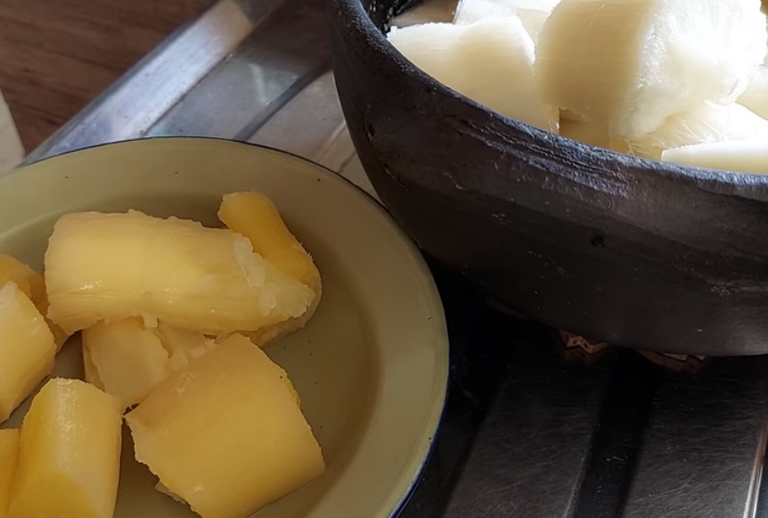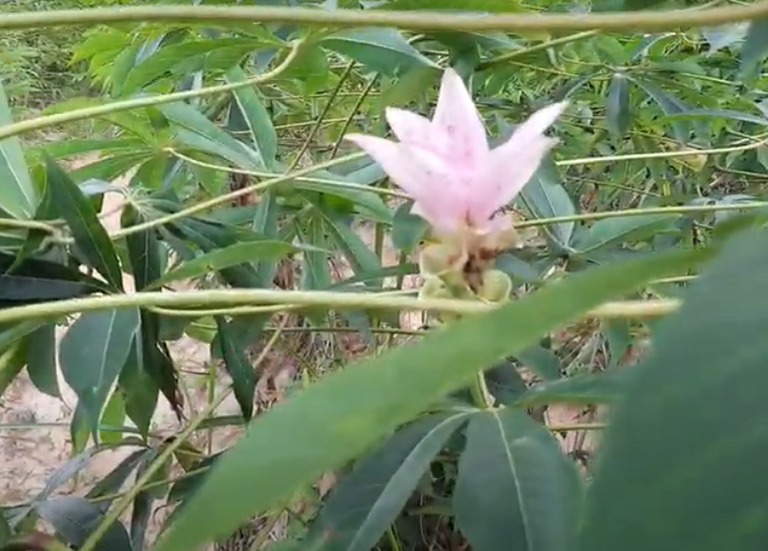Cassava root is a crucial nutritional food for millions of people throughout the world since it is high in calories, carbs, and vitamin C, as well as being flexible and flavorful. Cassava root can be cooked, baked, or fried and used to any recipe. It's also used to manufacture gluten-free flours and thickeners like arrowroot (a starch-derived product), tapioca flour, and cassava flour.

Cassava root has a fibrous texture that is sometimes mistaken for potatoes and also resembles zucchini. It is available in both bitter and sweet variants. It is typically boiled, cooked, or processed into various flours and powders for use in baking.
- Cassava Root's Health Benefits
- Aids in the prevention of oxidative stress
Antioxidants, which are helpful substances that neutralize free radicals to reduce oxidative stress and cell damage, are abundant in cassava root. Antioxidants, according to research, play a critical role in overall health and may protect against a variety of chronic diseases, including cancer, diabetes, and heart disease.

Vitamin C and manganese, two minerals that can help reduce oxidative stress, are also abundant in cassava root. Over a five-year period, vitamin C intake dramatically reduced oxidative stress and free radical generation, according to a study published by the National Cancer Center Research Center for Cancer Prevention and Screening in the United States.
- Improves the health of the skin
Many natural skin care treatments contain cassava root as a component. The roots of the cassava plant can be blended with honey or olive oil and applied as a facial mask to brighten the skin, while the leaves can be used to exfoliate the skin and remove dead skin cells.

Your skin will glow even if you include cassava root in your favorite dishes. It's high in vitamin C, a substance that plays a role in collagen synthesis and is thought to have anti-aging benefits. Vitamin C has also been proven to decrease melanin formation, which can help prevent dark spots and hyperpigmentation, and may protect against sun damage by scavenging damaging free radicals.
- Assists in the relief of arthritic symptoms
Arthritis is a painful disorder that causes stiffness and swelling in the joints. Incorporating cassava root into your diet can help relieve rheumatoid arthritis symptoms due to its high antioxidant and manganese content (arthritis in small joints such as the bones of the hands, fingers, feet).

Manganese is frequently advocated as a natural arthritis treatment, and a study published in the American Journal of Epidemiology found that manganese insufficiency is linked to a higher incidence of rheumatoid arthritis in older women. Similarly, antioxidants found in cassava root may be particularly helpful in lowering inflammation and arthritic symptoms; one study found that persons with rheumatoid arthritis had considerably lower antioxidant serum concentrations than those without the disease.
- Aids in the immune system's function
Maintaining a strong immune system is undeniably important for overall health. To fight off external invaders and protect against diseases and infections, your immune system is responsible for keeping harmful bacteria, viruses, and fungi out of the body.
 Boiled Cassava
Boiled Cassava
Adding cassava to your diet is an easy method to give your immune system a healthy boost, as it is high in antioxidants and vitamin C. In fact, a research published in the Annals of Nutrition and Metabolism found that getting adequate vitamin C reduced the symptoms of respiratory infections like the common cold and shortened their duration. It's also been proved to help with illnesses including pneumonia, malaria, and diarrheal infections. Antioxidants aid in the battle against free radicals and oxidative stress, preventing immune system cells from being damaged.
 Fried Cassava
Fried Cassava
Cassava root also includes modest levels of vitamin E, pantothenic acid, calcium, iron, and selenium, in addition to the nutrients listed above.
Cassava Root and Ayurvedic Medicine
Cassava roots, while not extensively employed in holistic or modern medicine, fit well into an Ayurvedic diet that emphasizes eating a variety of fresh fruits and vegetables to maintain good health. Cassava root has traditionally been utilized by indigenous peoples to alleviate fevers and chills, promote female fertility, and relieve painful muscles.
 A flower in Cassava plant
A flower in Cassava plant
Cassava root also includes antinutrients, which are chemicals that might prevent certain vitamins and minerals from being absorbed. This should not be a serious concern for most individuals who consume cassava root in moderation, but it can cause nutritional deficits in those who utilize it as a dietary fiber.
Thank you very much for taking the time to read the article. Keep supporting and stau tuned to my blog.

These pictures are my own properties. These were clicked with MI 11. Footer made with android app.
 Antioxidants, according to research, play a critical role in overall health and may protect against a variety of chronic diseases, including cancer, diabetes, and heart disease.
Antioxidants, according to research, play a critical role in overall health and may protect against a variety of chronic diseases, including cancer, diabetes, and heart disease. 
 diabetic myself, I have started using more cassava root already in my diet. One thing that I particularly enjoy is oven-baked cassava chips, to replace regular potato chips (or "crisps" as American's call them) as a healthy snack.
diabetic myself, I have started using more cassava root already in my diet. One thing that I particularly enjoy is oven-baked cassava chips, to replace regular potato chips (or "crisps" as American's call them) as a healthy snack. Hive Diabetes Peer Support (HDPS) Community. We are a new
Hive Diabetes Peer Support (HDPS) Community. We are a new  HIVE Community created recently, and officially launched on 1-Apr-2022, here on the social blockchain and on
HIVE Community created recently, and officially launched on 1-Apr-2022, here on the social blockchain and on  Discord. Our goal is to become a place to discuss your own or a loved one's experience of diabetes, for shared mutual peer support and encouragement.
Discord. Our goal is to become a place to discuss your own or a loved one's experience of diabetes, for shared mutual peer support and encouragement.